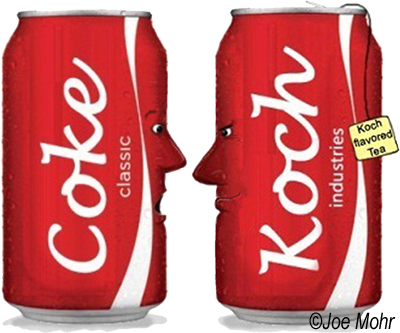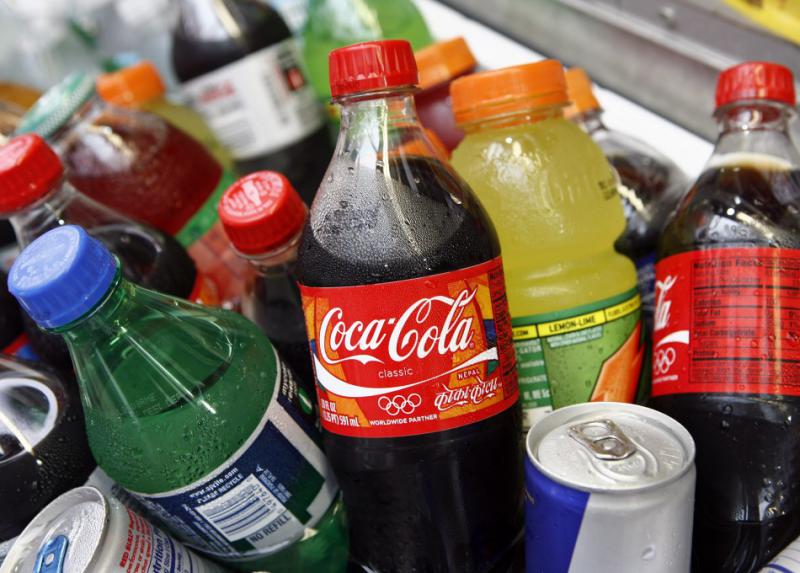Submitted by Rebekah Wilce on
 What is Coca-Cola doing behind closed doors with Koch Industries and other multinational corporations in the American Legislative Exchange Council (ALEC)? Coca-Cola Refreshments' Director of Public Affairs and Communications, Gene Rackley, represents Coke on ALEC's "Private Enterprise" Board, along with Koch Industries' Michael Morgan.
What is Coca-Cola doing behind closed doors with Koch Industries and other multinational corporations in the American Legislative Exchange Council (ALEC)? Coca-Cola Refreshments' Director of Public Affairs and Communications, Gene Rackley, represents Coke on ALEC's "Private Enterprise" Board, along with Koch Industries' Michael Morgan.
Coke and ALEC have a lot in common. Both love free trade and have been big boosters of free trade agreements, such as the Korea, Panama and Columbia agreements facing votes this week in Congress. Both are dubious about recycling, especially taxes applied to industry to pay for mandatory recycling. But in one area, ALEC policy benefits Coke and other sweet drink makers directly.
Resisting Regulation of "Liquid Candy"
 A Centers for Disease Control study recently found that "sugary drink intake in the U.S. has increased over the last 30 years, and sugared beverages" (defined for the study as fruit drinks, sodas, energy drinks, sports drinks, and sweetened bottled waters -- all of which Coca-Cola produces) "have been linked with weight gain, obesity, poor diet, and, in adults, type 2 diabetes."
A Centers for Disease Control study recently found that "sugary drink intake in the U.S. has increased over the last 30 years, and sugared beverages" (defined for the study as fruit drinks, sodas, energy drinks, sports drinks, and sweetened bottled waters -- all of which Coca-Cola produces) "have been linked with weight gain, obesity, poor diet, and, in adults, type 2 diabetes."
Obesity remains a pressing and growing public health problem that can be quite costly to taxpayers, who subsidize much of the treatment of obesity, diabetes, and other expensive health problems. According to the Center for Science in the Public Interest (CSPI), which has dubbed sugary drinks "liquid candy," only sugary drinks have been shown to have a causal role in promoting obesity. "Unlike milk or juice, soda provides nothing but empty calories to the diet -- it is a totally unnecessary and worthless product that everyone would do well to avoid," says CSPI Director Michael Jacobson.
Nevertheless, the American Beverage Association (ABA), which lobbies on behalf of its members including Coke, claims that "sugar-sweetened beverages are not driving health issues like obesity and diabetes."
Is Soda the Next Tobacco?
States and localities are seeking policy options that work to cut consumption of sugary beverages for kids and adults. Many school districts, cities and states have banned sugary drinks in schools. Boston's ban is paying off, as new data indicates that the ban means high school students drink less of such beverages even when they're not in school. New York is seeking a ban on use of food stamps to purchase sugary drinks. California is seeking a ban on sugary drinks in day care settings. In addition, policymakers are looking hard at soda taxes to discourage the consumption of these beverages overall, in much the same way that tobacco taxes have discouraged the use of tobacco.
As of 2009, according to the New England Journal of Medicine, 33 states already have sales tax on soft drinks, but the taxes (mean tax rate 5.2%) "are too small to affect consumption and the revenues are not earmarked for programs related to health." Nutrition and health groups have been working hard to convince legislators both at the federal and state level that taxes on "liquid sugar" will lower obesity rates and be a new revenue source for cash-strapped states.
In 2009, soda taxes were actively discussed as a way to pay for the Obama health care plan. The ABA spent $18.9 million in 2009 on lobbying, compared with about $668,000 in 2008, with most of the money going toward ads against a federal soft-drink tax. In the same year, soda taxes were introduced in 12 states. In 2010, some 20 states considered new taxes, or the removal of tax exemptions for these drinks. Data from CSPI indicates that states could generate a total of more than $10 billion per year by levying a tax of 7 cents per 12-ounce can of Coke or Mountain Dew and offers a "liquid candy calculator" on its website for public officials to calculate the revenue new taxes could generate.
Coke and the ABA are campaigning hard against these measures, largely successfully. In Philadelphia, they defeated a modest tax on soft drinks by using the tobacco industry tactic of applying strategic philanthropy to purchase leverage in the form of goodwill. The ABA formed a deceptively-named front group, the Foundation for Healthy America, that they then used to funnel a $10 million donation to the Children's Hospital of Philadelphia to, of all things, expand its obesity program.
Coke and the ABA have successfully resisted bills and overturned laws imposing taxes on soft drinks in Florida -- thanks to Agriculture Commissioner and ALEC alumnus Adam Putnam -- New York and Washington State.
Effects on "Hardworking Americans"
In 2009, when soda taxes were front page news with some frequency, the American Legislative Exchange Council (ALEC) approved "A Resolution in Opposition to Discriminatory Food and Beverage Taxes" (pdf). This fill-in-the-blank resolution is couched in pro-worker language, concluding that (fill-in-the-blank State) "fully supports hardworking Americans, and opposes all efforts -- federally and on the state level -- to impose discriminatory taxes on food and/or beverages."
When ALEC and its deep-pocketed corporate members like Coke cry "discrimination" and claim to support "hardworking Americans," consumers should take a closer look at Coke's legislative and marketing agenda.
It is hard to imagine why a name-brand corporation like Coke wants to associate itself with the far-right policies of ALEC, such as ALEC's voter suppression bills which disenfranchise college students in states like Wisconsin, ALEC efforts to privatize Medicare and Social Security and ALEC's immigrant bashing policies.
If you think Coke should get out of ALEC, you can take action! Click here to send a letter today to President and CEO of Coca-Cola, Mr. Muhtar Kent, telling him to DUMP ALEC!

Comments
Anonymous replied on Permalink
Let's keep in mind that we
popsflys replied on Permalink
What are they up to?
eyon replied on Permalink
I bet its water aswell
Progressive Rep... replied on Permalink
liquid candy